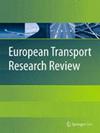Modelling public attitude towards drone delivery in Germany
IF 4.2
3区 工程技术
引用次数: 0
Abstract
Abstract Background Last-mile delivery by drone is expected to be a promising innovation for future urban logistics. However, in addition to adoption of services by customers, leveraging this delivery method will depend essentially on a positive public perception of such services in urban airspace. Objective This article provides novel and comprehensive insights into factors driving or impeding citizens' attitudes towards drone delivery. Methodology The article develops a structural equation model that derives from a sequential exploratory mixed methods design. In the first step, factors affecting attitudes towards drone delivery were identified within the scope of five focus groups and converted into the development of a questionnaire. In the second step, a German population-representative survey was conducted through telephone interviews, which provided reliable data to test the model (n = 819). Results Expected risks (particularly stress due to traffic in lower airspace, noise, and visual disturbances), as well as expected benefits (particularly fast and time-flexible delivery), significantly affect attitudes towards drone-based delivery, while the individual level of technological openness (technophilia) does not have a significant association. Moreover, the model reveals that the expected risks of drone deliveries are stronger associated with public attitude than with expected benefits. Conclusions The provided framework suggests fashioning policies and drone delivery applications that focus on mitigating social, spatial, and visual risks while achieving maximum utility for customers.模拟德国公众对无人机送货的态度
无人机最后一英里配送有望成为未来城市物流的一项创新。然而,除了客户采用服务之外,利用这种交付方法将主要取决于公众对城市空域中此类服务的积极看法。本文对影响或阻碍公民对无人机送货态度的因素提供了新颖而全面的见解。本文建立了一种基于顺序探索性混合方法设计的结构方程模型。在第一步中,在五个焦点小组的范围内确定影响对无人机交付态度的因素,并将其转化为调查问卷的开发。第二步,通过电话访谈的方式进行德国人口代表性调查,为模型的检验提供了可靠的数据(n = 819)。结果预期风险(特别是低空域交通、噪音和视觉干扰造成的压力)和预期收益(特别是快速和时间灵活的交付)显著影响对无人机交付的态度,而个人水平的技术开放性(技术癖)没有显著关联。此外,该模型还显示,无人机配送的预期风险与公众态度的关系大于与预期收益的关系。所提供的框架建议制定政策和无人机交付应用,重点是减轻社会、空间和视觉风险,同时为客户实现最大效用。
本文章由计算机程序翻译,如有差异,请以英文原文为准。
求助全文
约1分钟内获得全文
求助全文
来源期刊

European Transport Research Review
Engineering-Mechanical Engineering
CiteScore
9.70
自引率
4.70%
发文量
49
期刊介绍:
European Transport Research Review (ETRR) is a peer-reviewed open access journal publishing original high-quality scholarly research and developments in areas related to transportation science, technologies, policy and practice. Established in 2008 by the European Conference of Transport Research Institutes (ECTRI), the Journal provides researchers and practitioners around the world with an authoritative forum for the dissemination and critical discussion of new ideas and methodologies that originate in, or are of special interest to, the European transport research community. The journal is unique in its field, as it covers all modes of transport and addresses both the engineering and the social science perspective, offering a truly multidisciplinary platform for researchers, practitioners, engineers and policymakers. ETRR is aimed at a readership including researchers, practitioners in the design and operation of transportation systems, and policymakers at the international, national, regional and local levels.
 求助内容:
求助内容: 应助结果提醒方式:
应助结果提醒方式:


